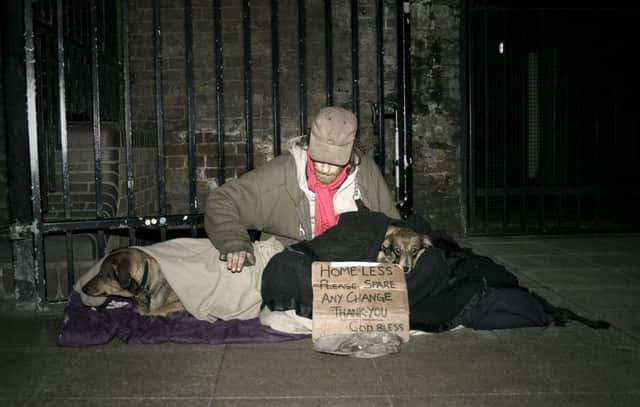Edinburgh Council to encourage rough sleepers to beg for money


Between 80 and 120 rough sleepers spend the night on the streets of the capital – and the council is set to push ahead with plans to extend a Rapid Access Accommodation (RAA) scheme at Hopetoun Crescent, close to the top of Leith Walk, after 73 per cent of 43 rough sleepers were helped move off the streets during the 90-day pilot.
Some local authorities in England have used anti-social behaviour legislation to essentially ban and fine beggars – but the city council is encouraging the begging to help rough sleepers who cannot access benefits afford food.
Advertisement
Hide AdAdvertisement
Hide AdThe high tolerance scheme allowed those to be given a room before being assessed and residents were under no curfew during their stay – allowing them to go out and beg. The authority will now push forward plans to continue and extend the service.
A report to the council’s Housing and Economy Committee by officers said: “Given that many rough sleepers experienced mental health and addiction issues, a high tolerance approach to possible disruptive behaviour was required to maintain engagement.
“Residents’ feedback indicated that the lack of curfew was of key importance as to why they felt comfortable staying in the RAA. They could access the accommodation 24 hours daily – this was especially important for residents engaged in street begging.”
Out of 46 people who stayed at the RAA during the trial, 35 had “positive outcomes”. One person was asked to leave by council staff due to “threatening conduct” while four others left after being taken into police custody after incidents at the RAA.
Advertisement
Hide AdAdvertisement
Hide AdCllr Kate Campbell, convener of the council’s Housing and Economy Committee, said: “Essentially, it’s a B&B where there was no curfew and there was high tolerance – basically it was to reduce as many barriers as we could for people.
“People who are rough sleeping are not accessing benefits for a number of reasons – it might be because they don’t have a bank account because they don’t have an address. Lots of people who were eligible for benefits were able to open bank accounts and then access more suitable accommodation.
“A lot of people who are not accessing benefits need to beg to be able to feed themselves. It has been hugely successful as 73 per cent of people were able to be helped move off the street.”
During the pilot, of 23 residents not receiving benefits, all were surviving on “free food” services and 12 were known to have been street begging to ensure they had money. Another eight residents who were in receipt of benefits were also known to be street begging and 20 of the 48 residents were known to be street begging over a three month period.
Advertisement
Hide AdAdvertisement
Hide AdThe report also reveals that “not being in receipt of benefits was the main reason for people resorting to begging”.
Cllr Cameron Rose, Conservative spokesman for housing, said: “I welcome any success in solving the complex issues which lead to people sleeping on the streets. Positive outcomes for 35 of the 46 people who were able to benefit from the centre looks good and this pilot claims to have reduced the need to beg on streets.
“It is always important to ensure caring action does not just sustain people in a harmful and unhelpful lifestyle. The extensive network of support must always work towards moving people on to better circumstances.”
Green councillors have welcomed the attempt to tackle rough sleeping – but criticised the link-up with the private sector.
Advertisement
Hide AdAdvertisement
Hide AdGreen housing spokesperson, Cllr Susan Rae, said: “If Edinburgh is going to get serious about helping people away from sleeping rough then services need to work with where people are: that includes current health problems, addictions, access to money or experience of abuse. Over the last 20 years these kinds of services have been cut so it is important the gap has been recognised and a commitment made to fill it.
“The commitment needs to be a long term one, so I would much rather the council was developing the service with a local voluntary organisation or charity than going to the private sector. And I will want to see a full financial plan so that I can be sure that a service can be run in the long term.”